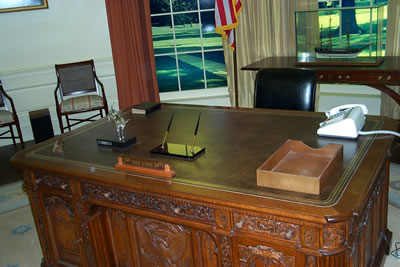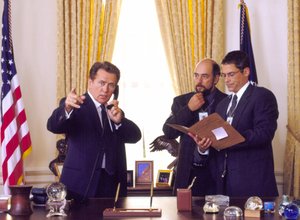Transferring Power…and Paper: The First Day at a New Desk
Do you have a new office?
The concept of the American inaugural process is fascinating to anyone who has studied history. Throughout most centuries, transfer of power between leaders involved one death (of the monarch) or lots of death (from the blood of war). No matter who one favors in any given election, the notion of a celebratory and bloodless transfer of power every four or eight years is remarkable…in both theory and practice.
But what about the transfer of stuff? All last week, the news reporters were talking about how, in six hours, a White House staff of 95 (the one group of people who never even get to watch the inaugural speeches and proceedings), using only two elevators, will move all of the outgoing president’s (and his family’s) belongings out while simultaneously moving all of the incoming president’s (and his family’s) belongings in…and not just in, but organized and put away. The new First Family (and every new First Family in modern times) arrives at their new home without a packing box in sight!
(Wouldn’t you love it if every household move you made could be so free of chaos?)
Paper Doll, however, has noticed that nobody ever interviews the Civil Service or administration staffs about effecting the transfer of paper, files and documents. Whenever you see the Oval Office (whether the real

or fictional  variety), any president’s desk is pretty devoid of paper clutter (though there always seem to be lots of photos and knick-knacks).
variety), any president’s desk is pretty devoid of paper clutter (though there always seem to be lots of photos and knick-knacks).
I’ve often wondered if an efficient aide whisks away any document the minute the president has ceased using it so that our Commander in Chief may request it (Mrs. Landingham?!!!) as if from a reference librarian, to ensure that nobody ever has to whisper a sing-song “Well, we were going to give everyone a $10,000 tax credit, but somebody seems to have lost the file between his desk and his curved office walls.”
So, whether you’ve just been put in charge of a country, a company or a cubicle, there are a few things you might want to do in the early days to get a handle on the paper bequeathed to you by the former occupant(s):
Don’t Complain
Don’t be quick to make assumptions about the last owner of the office. Skillfully organized files are not necessarily signs of genius (though Paper Doll likes to believe it’s so), nor do toppling piles tell you anything about the intellect of your predecessor. For all you know, the last person spent every waking hour trying to undo the clutter of her predecessor. Don’t badmouth his (or her) paper systems (or lack thereof). If anyone asks, your working quickly to get up to speed and customize the material into a system that lets you maximize everyone’s priorities. (Or create your own brand of corporate-speak.)
Create Categories
Once you’ve gone through everything, you’ll have a better sense of what you have as well as what you can toss, but start by sorting the papers and files into categories that work for you. At the beginning, think in terms of:
- Emergency contacts–Even if you have a Rolodex or computer database, there are going to be addresses and phone numbers for people you’ll be calling to beg for help in the early days. Set aside loose papers bearing that data so you can make an emergency file. Once you’ve created a list on the computer, print it out and keep it on the wall or bulletin board next to your desk.
- Administrivia–Maintain information about your staff, if you have one, handbooks and policy manuals, human resource policies, general 401(k) and other benefits information. If your interview did not make clear all of the administrative or supervisory duties you’ll have, now is the time to find out.
- (Personal) Personnel/Financial–Keep copies of blank and completed time sheets, vacation request forms, evaluation forms, expense report sheets, and purchase orders; if possible, keep your personal benefits and financial information in files at your residence rather than at work.
- Contracts–Make sure the documents you have are valid and up-to-date. Once you’ve sorted them, take notes and make a cheat sheet so you can consult the deal points (costs, schedules/delivery dates, contact numbers, etc.) at a glance. Create the information in a spreadsheet you can easily change, and keep a printout handy.
- Clients/Customers–Again, use the files to help you create a cheat sheet until you are familiar enough to chat with clients without any notes. Make sure you’re clear on who is a prospect vs. who is or was an actual client.
- Vendors or Service-Providers–Are the files complete? Up to date? If the previous occupant wasn’t diligent, you might have brochures and background on companies that are no longer in business.
- Creative or marketing–If you can sort creative work by project or type, and then in reverse chronological order by date, you’ll have a sense of the history of each project. If papers lack background information, you can sort visually, by what “seems” to match, until you can check with others.
- Computer information–Passwords, file names, network protocols all need to be sorted out and updated (See below)
- Computer manuals–Don’t clutter the prime real estate of your desk or drawers with these files. Obtain and use a small bookshelf for reference documents.
Get a Reality Check
Make a list of all the vendors, clients and/or contracts you currently have and check them against the computer records and the records of your financial department. If you have a staff, make sure the employee files (including pay data) are in a drawer you can lock.
Change the Passwords
There’s no knowing how long those Post-Its bearing passwords have been affixed to the monitor for all (from coworkers to cleaning staff) to see. Check with IT and/or your supervisor, and then change and document every internal and external password. Keep this information under lock and key.
Request Feedback
Talk to your boss, your colleagues, your assistants early in the moving-in process to make sure you haven’t made erroneous assumptions. For example, Joe’s Little Store could actually represent millions of dollars to your company, and files called “Important Stuff” could yield nothing worthy of your attention. Find out what your boss (and his assistant!) thinks are the most important clients or customers, what are the most urgent priorities (so you can search for papers related to them amid the toppling piles) what were the biggest mistakes made in the past
Get Rid of Ghosts
In other words, you need to jettison the former occupant of your desk. Seriously. You don’t need her dental appointment reminder cards, the novel she was reading, or her children’s artwork. If you’re inclined, you can put anything personal in a big kraft envelope and give it to the human resources department to transfer to the former owner. The stuff doesn’t belong to you, so deciding what to keep and toss doesn’t fall under the purview of your position. Let HR work it out.
Develop A System That Works For You
Even if it means coming in on a few Saturdays, create a filing system for your action papers and reference documents that works the way you think. The type of system is only important in that you will likely only commit to using something that makes sense for you.
You spend a third or more of your life in your office, and much of that time at your desk. Don’t you want to use that time as efficiently and as effectively as possible?
- Become a member of the Clean Desk Club and you’ll likely impress your boss, improve your productivity and reduce your stress level.
- Get a tickler file (and learn how to use it) to handle actionable papers (those that represent tasks) and start by following up on the stuff your predecessor failed to complete. The sooner you close those open loops, the sooner you can craft your office set-up to reflect the way you work best.
- Consult your supervisor, your contracts and your colleagues to make sure you know all of your upcoming deadlines, and schedule them in your planner. Work backwards from those deadlines to make sure you have all of the documents you need to get where you want to go.
Of course, if you’re the leader of the free world and are reading this for tips on how to handle the papers left by the other guy, maybe you should just forward the URL for this post to your Chief of Staff? With all due self-respect, Paper Doll thinks you may have more important things to do right now.




Follow Me